HVO FUEL PROVEN TO BE EFFECTIVE FOR DIESEL GENERATOR SETS
The energy landscape is changing rapidly with a clear focus on cleaner solutions in the pursuit of net zero emissions. The goal is to achieve this reduced environmental impact without sacrificing the hallmark benefits of reliability, efficiency, and load acceptance of diesel gensets.

Testing fuel performance
Rolls-Royce approves the use of synthetic paraffinic diesel fuel, also referred to as Hydrotreated Vegetable Oil (HVO), for its mtu Series 4000 and Series 1600 gensets in power generation applications. This paper provides a detailed review of the testing of an mtu Series 4000 diesel generator set operating on standard diesel fuel as well as on HVO fuel.
System tests were conducted in the field with mobile measurement technology. Engine-only tests were performed on a test bed, generating more accurate data results. The results of the testing confirm the effectiveness of HVO as a drop-in fuel for mtu diesel generator sets. In comparing the performance criteria between diesel and HVO fuel, no significant effects on general performance were observed. In fact, several positive factors were observed when using HVO.
HVO testing showed:
- A decrease in NOx, CO₂, and PM
- Improved response to load acceptance
- Full power performance
- Decreased fuel consumption
- This test was conducted using both an mtu 20V 4000 G94S engine as well as a 20V 4000 DS3000 generator set.
The assessment of this test addressed the following areas:
- Load step behavior: Diesel & HVO
- Emissions testing: Diesel & HVO
- Fuel consumption comparison
- Endurance run on HVO
Fuels tested
The testing comparison of engine generator set performance was conducted using distillate diesel fuel and HVO. The diesel fuel used followed DIN 51603 (B0) and the HVO fuel followed EN15940 Class A. In the U.S., engine-only tests were performed using ULSD and HVO meeting ASTM 975. The chart below also shows ASTM D975 and EN 590 for reference.
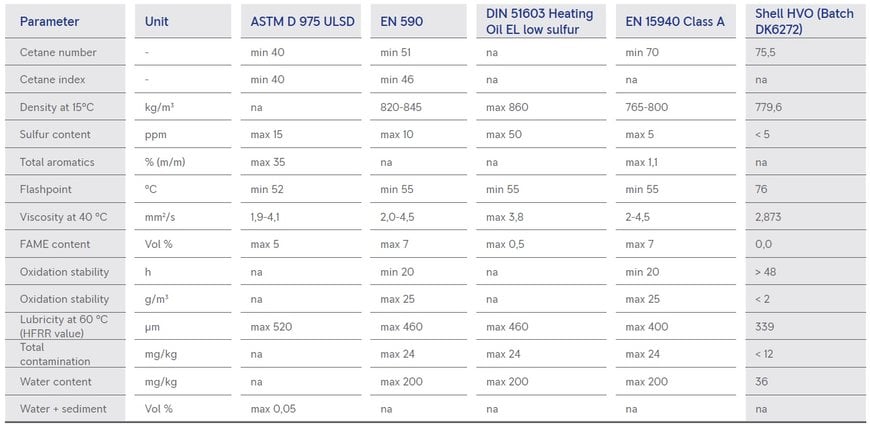
For reference, Shell HVO is t he fuel sam ple from the testing as a com parison to the standards. Note: Fuel specifications state ranges, maximums, or minimums f or various fuel characteristics.
Test results
The test was completed using a complete generator set. On both fuels, the full nameplate rating of the genset was achieved. The emission test equipment was installed after the engine in the exhaust system.
Fuel consumption
Figure 1 shows data from the engine via ECM recording, comparing engine power and fuel consumed at each load point. The unit was loaded to the same electrical load for each load step on the two different fuels.
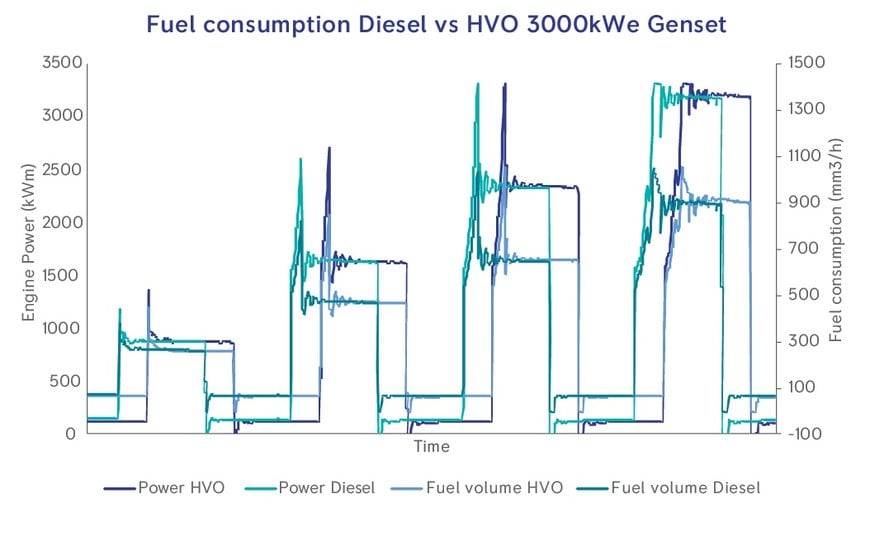
Figure 1
Below, Figure 2 shows the fuel consumption for the EPA D2 cycle load points based on an engine brake dynamometer. The results show HVO has a higher energy per mass, but a lower energy per volume. Therefore, fuel consumption values for HVO could differ slightly from published values for distillate diesel fuel and this should be taken into consideration if permitting is based on fuel consumption.
The chart on the left shows the specific fuel consumption improves using HVO, which can be explained by higher combustion efficiency due to HVO’s higher Cetane number. However, the chart on the right shows a slightly higher volumetric fuel consumption, which can be attributed to the HVO’s lower density.
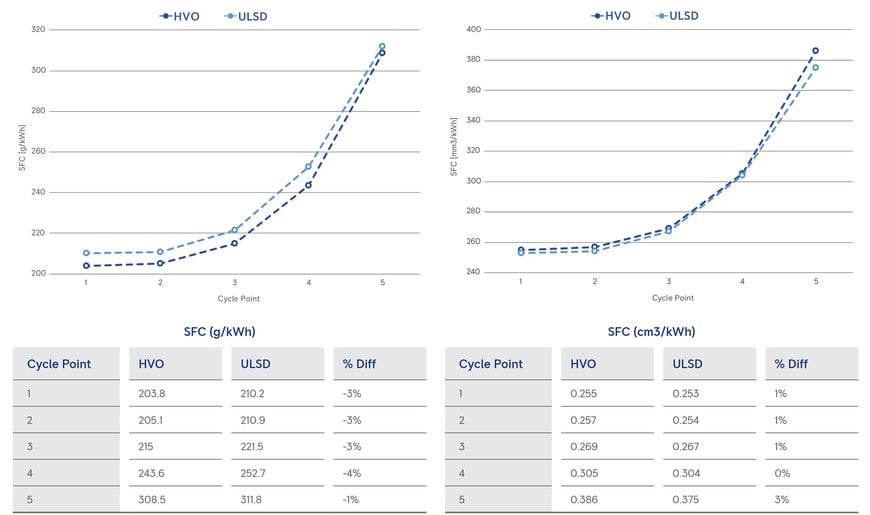
Figure 2: Fuel consumption from dynamometer testing
NOx comparison
For the NOx values, a 5% error bar is added to the charts to show potential sensor error (Figure 3). The data shows a NOx reduction of approximately 8% when operating with HVO, with a higher reduction at lower loads. When looking at the EPA weighted average (D2 cycle), the delta becomes more evident on the potential reduction (Figure 4).
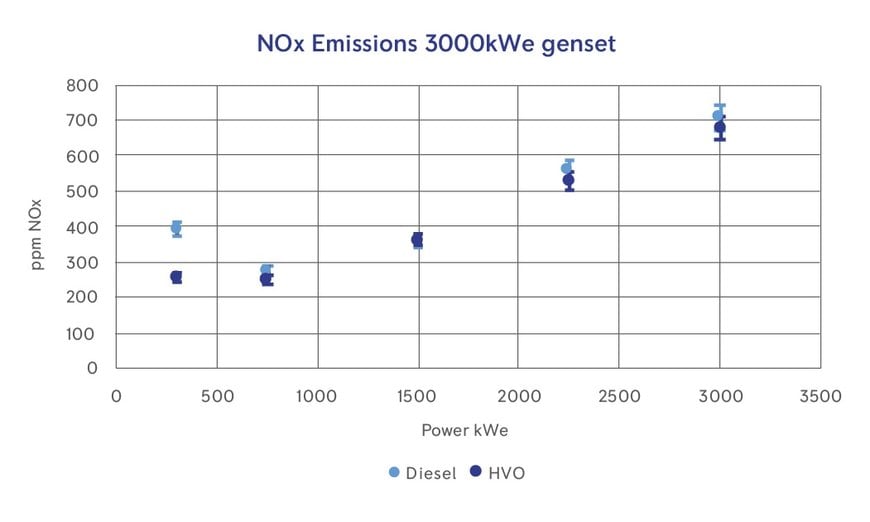
Figure 3
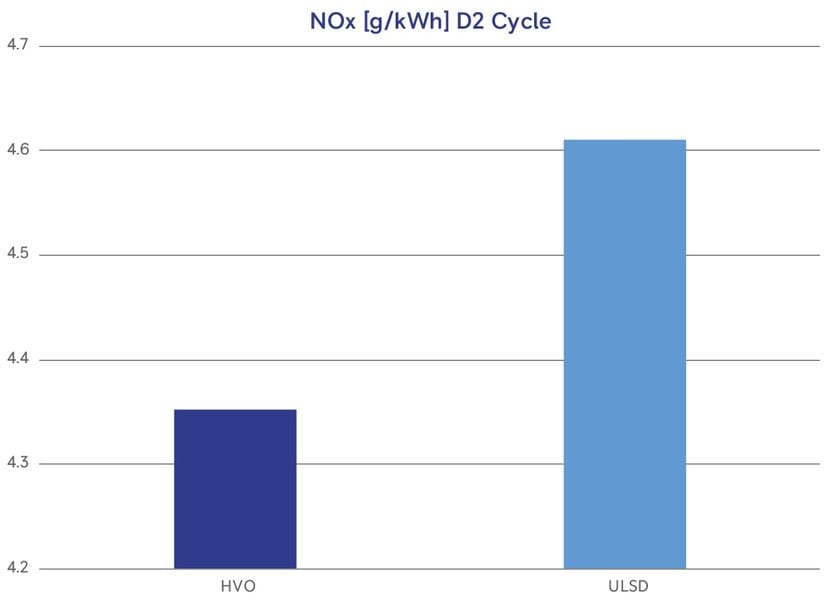
Figure 4
CO₂ comparison
The test analyzed tail pipe emissions, including CO2 values. A reduction of 3% was seen in the D2 Cycle emissions testing.
The real CO₂ advantage of HVO, and why it is considered a renewable fuel, is not reflected in the data but can be found in the feedstock and the total CO2 reduction from well-to-wheel. Whereas coal does not absorb CO₂ before it is converted into diesel fuel, the feedstocks used for HVO (such as sunflower) absorb CO₂. This results in a very minimal increase of total CO₂ emissions if using HVO. CO₂ neutrality differs by feedstock and production process.
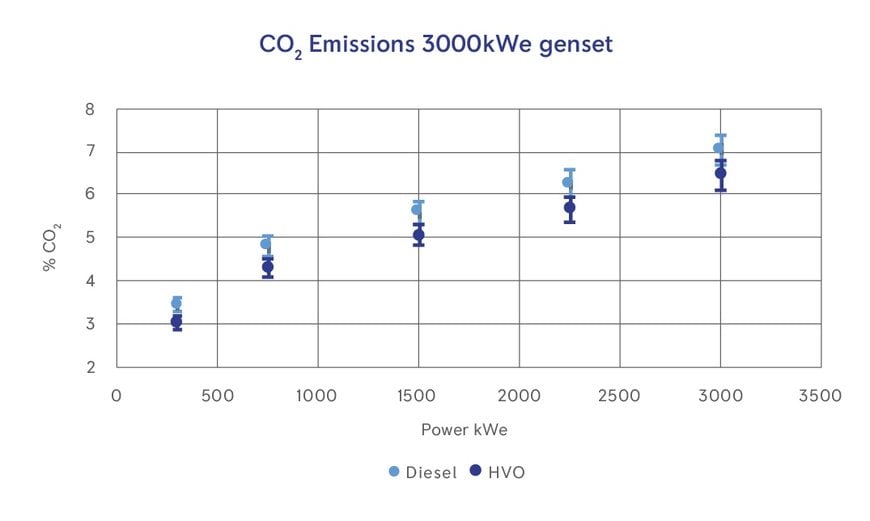
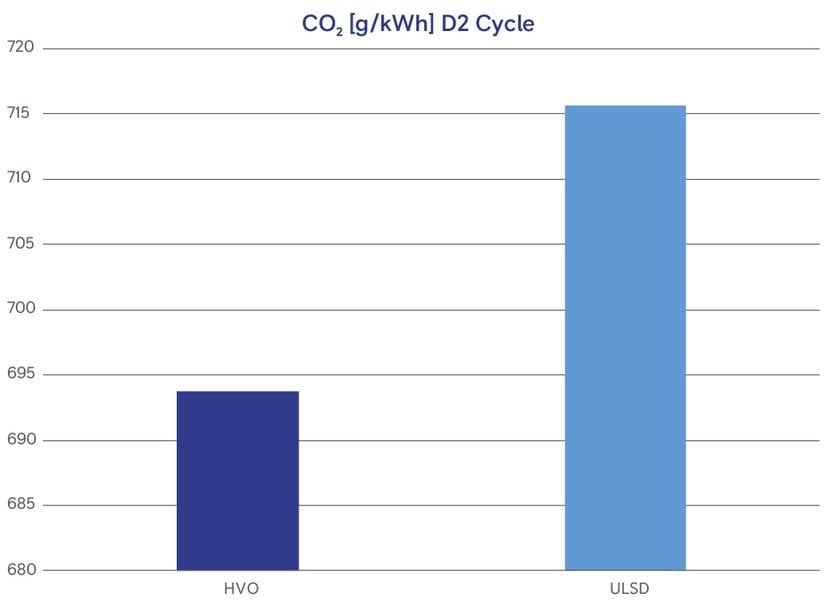
Figure 5
Particulate Matter (PM) comparison
Significant reduction in PM emissions was observed when operating on HVO fuel. The reduction of PM emissions ranges from 50-80% depending on load point, with a 42% reduction in D2 cycle emissions.
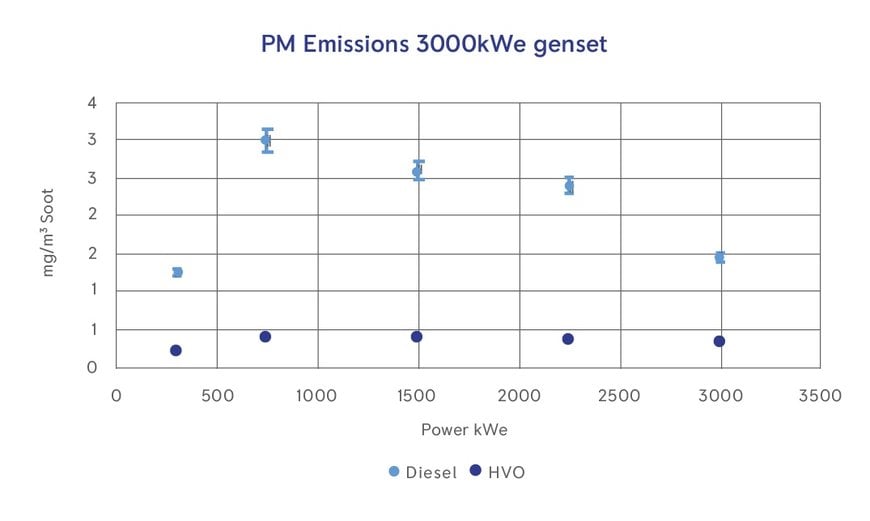
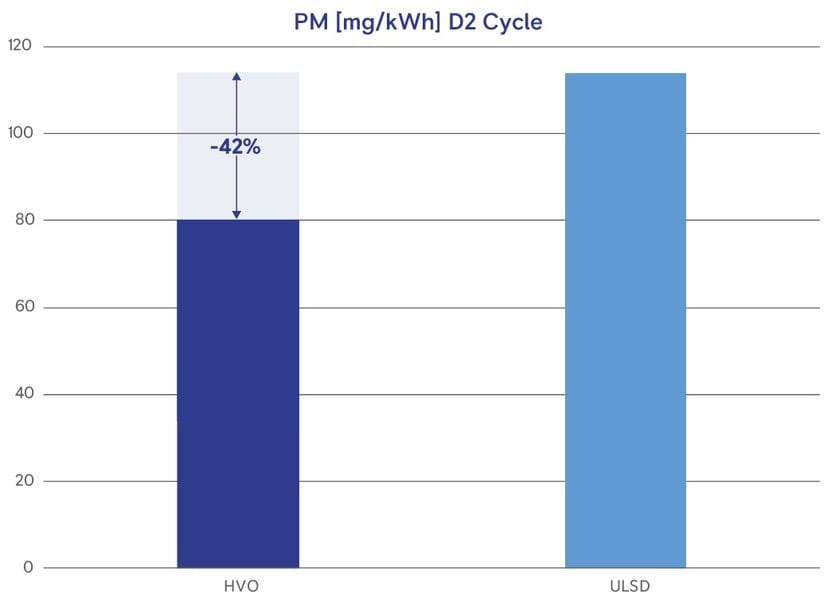
Figure 6
Transient response
The transient behavior when operating on HVO fuel is comparable to the performance of operation with distillate diesel fuel. Figure 7 provides a summary of the load steps with the corresponding frequency dip and recovery time.
Figures 8 and 9 show the behavior of each fuel as well as the acceptance tolerance according to ISO 8528 for voltage and frequency.
The end of line (EOL) parameters for this engine were adjusted using diesel fuel. Figure 9 shows the same maximum power was achieved using HVO even if the end-of-line-testing is done with diesel fuel.
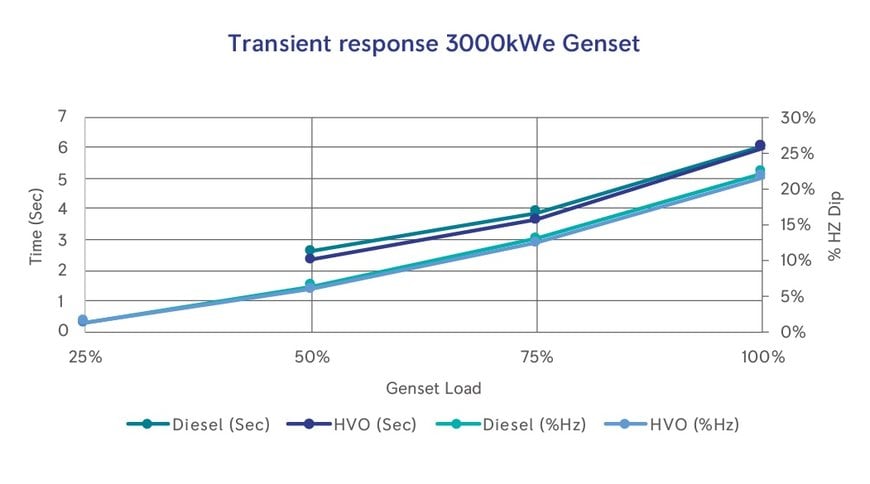
Figure 7
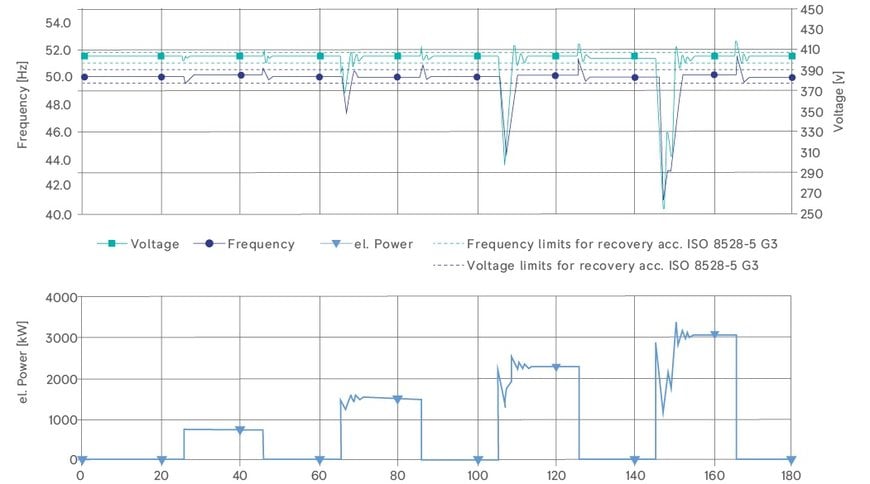
Figure 8: Transient behavior with distillate diesel
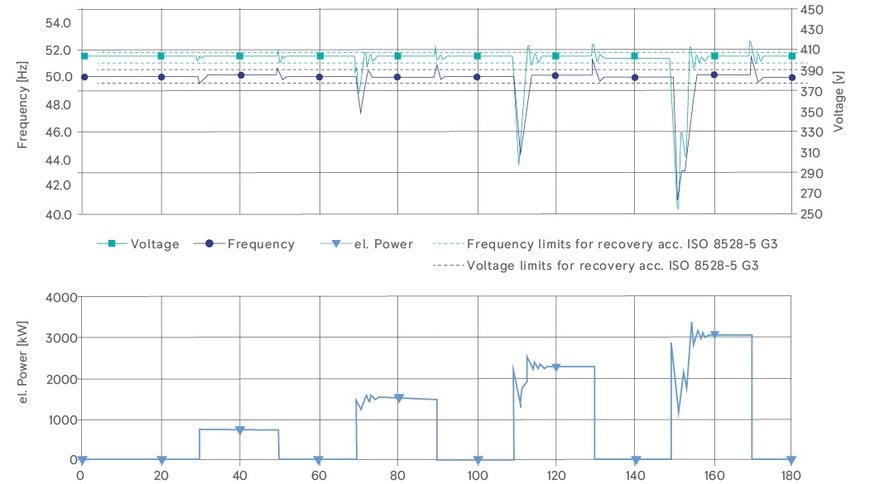
Figure 9: Transient behavior with HVO fuel
Conclusion
The use of HVO as a drop-in fuel has shown acceptable performance in controlled applications. Therefore, HVO fuel is approved for use in mtu Series 4000 and Series 1600 generator sets.
The testing showed full nameplate power could be achieved equally using both fuels. In addition, the test shows the following benefits when operating on HVO fuel as an alternative to distillate diesel:
- Lower NOx, PM and CO₂ emissions at nearly all load points
- Marginal transient performance improvement
As with all fuels, the end user must work closely with its fuel supplier to ensure it is getting the optimal fuel for its application and installation. In addition, proper fuel storage must also be assessed, as it is important for the fuel to be of acceptable quality to ensure reliability and sustainability of the product. Lastly, the feedstock for the HVO fuel should be considered to truly assess the well-to-wheel CO₂ reduction and environmental impact.
Please consult with your local mtu representative when using HVO fuel.
www.mtu-solutions.com

